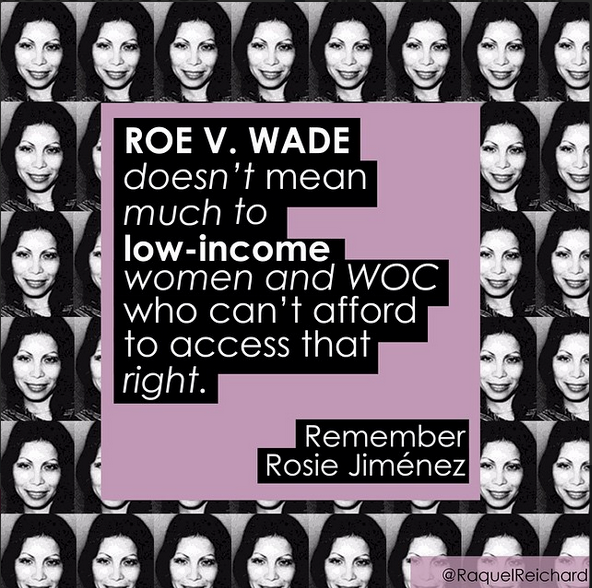Note: In honor of All* Above All’s United for Abortion Coverage Week of Action (September 25 – October 1), this is a guest blog from Feminist Majority Foundation Summer 2016 Intern Hannah Ferster, a sophomore at the College of William and Mary majoring in Sociology with a minor in Public Health.
Henry John Hyde is remembered for many things. A graduate of Loyola University Law School, he was elected to the Illinois House of Representatives in 1966. Following this, he served in the U.S. House of Representatives for 32 years as head of the Judiciary Committee and head of the International Relations Committee.
Without mentioning several controversies that marked his often eventful and polarizing career, it’s clear that Henry Hyde’s greatest legacy has been in the limiting of women’s reproductive health choices. In a 1999 Salon article, he was hailed as an avid “defender of family values and stern opponent of abortion,” whose namesake is reaffirmed each year with the continued passing of the Hyde Amendment.
This legacy is one of economic and health-related hardships for women, specifically, for low-income women. The original Hyde Amendment barred federal Medicaid money from funding abortion, except in instances when the pregnant woman’s life was in danger. The Hyde Amendment has to be re-approved every year, and its supporters have been successful in this every year since 1976 for a whopping FORTY YEARS this month. Women’s health advocates have fought to expand coverage to include funding for abortions in the case of rape or incest, but this is obviously not enough. We must remove all politically-motivated limitations to abortion—women are suffering.

Rosie Jiménez was one such woman; her story quickly became synonymous with the agony caused by the Hyde Amendment. She was an aspiring teacher, a Latina college student, and the single mother of a 5-year-old daughter. At 27 years old, Rosie was 6 months away from her teaching credential and was committed to creating a better life for her and her child.
When she became pregnant unintentionally, a doctor in McAllen, Texas told her they couldn’t provide the abortion for her unless she paid out of pocket because Medicaid would no longer reimburse the procedure. Rather than sacrifice her scholarship money, Rosie traveled to Mexico to obtain a cheap, illegal, dangerous abortion.
Rosie died of an infection on October 3, 1977, after seven days of suffering from septic shock in the hospital. The Hyde Amendment had gone into effect two months earlier on August 4. This law forced a woman—who was already struggling—to choose between her education or her own health for the sake of her family. This ultimately cost Rosie Jiménez her life.
Forty years later, Hyde’s legacy is still living on. In 2010, the Center for Reproductive Rights published a report on the Hyde Amendment showcasing confidential testimonials from women who, like Rosie, had been directly impacted by this legislation. The report shared the story of women like W.S., a 29-year-old mother of 6 struggling to keep her family on solid financial ground. She was receiving food stamps and public assistance for medical care, while her children were covered by Medicaid. She discovered she was pregnant again soon after her husband was fired from his job.
After heart wrenching deliberation, W.S. and her husband decided to obtain an abortion at 15 weeks because they simply could not take care of another child. Since public assistance and Medicaid do not cover the procedure, the cost for her abortion was more than $2,000. She had to borrow money from her brother under false pretenses and use part of her paycheck to cover it. She was given a little funding from the National Reproductive Justice Fund, and she and her husband both took out short-term loans. She pawned her wedding ring, her vacuum cleaner, her computer, and other personal belongings to finally afford the procedure. After her abortion, W.S. was given a prescription for pills to aid in her recovery. She never filled the prescription because she could not afford it. The Hyde Amendment forced her struggling family deeper into poverty.
The report recounted the story of women like R.L., a 26-year-old single mother balancing work and full-time studies, who became pregnant unintentionally by an abusive partner. The pregnancy only intensified the abuse, making her fear both for herself and her children. After deciding an abortion was the best choice, it took her another two months to figure out how she was going to make it work financially. The Hyde Amendment forced R.L. to stay with an abusive partner while she figured out how to end her pregnancy and get her and her children on safe, solid ground again.
The Hyde Amendment affects the most vulnerable women without discretion. Women who are already struggling financially, and don’t have reliable access to healthcare and contraception, are harmed. In 1977, when his Amendment was going into effect, Hyde stated, “I certainly would like to prevent, if I could legally, anybody having an abortion: a rich woman, a middle-class woman, or a poor woman. Unfortunately, the only vehicle available is the… Medicaid bill.” Four decades later, Hyde’s callous lack of concern for the lives of low-income women is still causing irreparable damage.
We have the chance, as young feminists, to change this in the next election. This could finally be the year when we repeal the Hyde Amendment, once and for all, and repair this fundamental right for all women. So go out and vote! Get all of your friends to vote! It’s time to hold our legislation accountable for this horrible idea that’s been reaffirmed without fail for 40 years. We need to ensure that the Henry Hyde’s of Congress will never again hijack our reproductive rights for decades to come.

